| Srl | Item |
| 1 |
ID:
130459
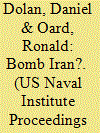

|
|
|
| 2 |
ID:
088649
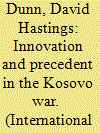

|
|
|
|
|
| Publication |
2009.
|
| Summary/Abstract |
The 1990s was a period of strategic innovation in US foreign policy. Operation Allied Force in particular represented an important step in the contorted evolution of America's attitude towards the use of force in the post-Cold War period. That operation demonstrated the growing influence of humanitarian concerns and the extent to which America was willing to reconsider Cold War criteria on the prudence and utility of force in support of its foreign policy. In its decision to intervene in Kosovo, the Clinton administration also divided opinion among the military. This, in effect, reduced the premium placed on the counsels of the armed forces and made it easier for the Bush administration subsequently to ignore their advice. Furthermore, having fought the war multilaterally through NATO, Operation Allied Force made America more wary of doing so again. In other words, the intervention set a number of precedents and left a significant legacy for the way in which US foreign policy was pursued in the decade that followed. This legacy is considered in two parts: the first analyses those issues associated with the use of force debate; the second considers how the Kosovo experience affected US attitudes to coalition warfare.
|
|
|
|
|
|
|
|
|
|
|
|
|
|
|
|
| 3 |
ID:
088643


|
|
|
|
|
| Publication |
2009.
|
| Summary/Abstract |
This article challenges the historical amnesia surrounding the whirlwind of international recognition of the state of Kosovo. It explores three theses concerning the role of international intervention and local politics in state formation. First, the article contends that Kosovar Albanians were 'backed into' the independent state option. Second, it makes a distinction between 'parallel states' and 'parallel societies', and explores the inadequacy of the thesis that, in the case of Kosovo, a parallel entity was waiting in the wings, prepared to step up and assume the mantle of a fully operational independent state. Third, it argues that Operation Allied Force was central to the eventual recognition of the independent State of Kosovo.
|
|
|
|
|
|
|
|
|
|
|
|
|
|
|
|
| 4 |
ID:
099863
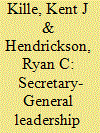

|
|
|
|
|
| Publication |
2010.
|
| Summary/Abstract |
The UN and NATO have been jointly engaged in a range of conflicts in the post-Cold War era. Studies of these organizations, however, have largely overlooked the institutional interplay between their Secretaries-General. After brief reviews of the relationship between the UN and NATO and the leadership role that a Secretary-General can provide, this article examines the political relationship between Kofi Annan and Javier Solana across three stages of NATO's 1999 Operation Allied Force in Kosovo. The findings show the important roles played and coordinated effort supplied by the Secretaries-General. This provides new perspectives on UN-NATO institutional coordination and has important implications for considering the relative security roles to be played by the UN and NATO in the future.
|
|
|
|
|
|
|
|
|
|
|
|
|
|
|
|
| 5 |
ID:
170466
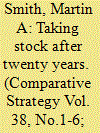

|
|
|
|
|
| Summary/Abstract |
Overall, there is mixed evidence of the enduring impact of the Kosovo crisis and Operation Allied Force (OAF) twenty years after the events. OAF and the follow-on deployment of the Kosovo Force (KFOR) in 1999 did consolidate and in effect make permanent a NATO and wider Western presence and set of interests in the Balkan region. NATO’s use of force against Serbia also caused the most serious rupture to date in its already-fragile institutional and diplomatic relationship with Russia, which revealed its fundamental weaknesses and limitations and from which it would never fully recover. On the other hand, and despite the widely perceived existential importance of its prevailing over Kosovo for NATO’s institutional credibility and effectiveness at the time, the longer-term impact of OAF and the KFOR deployment has proved transient and limited in terms of the institution’s ongoing post–Cold War evolution. This is evident not least in the failure to sustain and develop any distinct humanitarian dimension to NATO over the past two decades.
|
|
|
|
|
|
|
|
|
|
|
|
|
|
|
|
| 6 |
ID:
170460
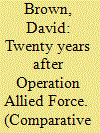

|
|
|
|
|
| Summary/Abstract |
Two decades after NATO’s Operation Allied Force (OAF) was successfully concluded in June 1999, to the extent at least of forcing Serbia to give up control of its rebellious Kosovo province, the articles in this special issue, timed to coincide with this anniversary, set out to explore the lasting controversies, implications and legacy of this demonstration of the use of coercive force for declared “humanitarian” purposes.
|
|
|
|
|
|
|
|
|
|
|
|
|
|
|
|